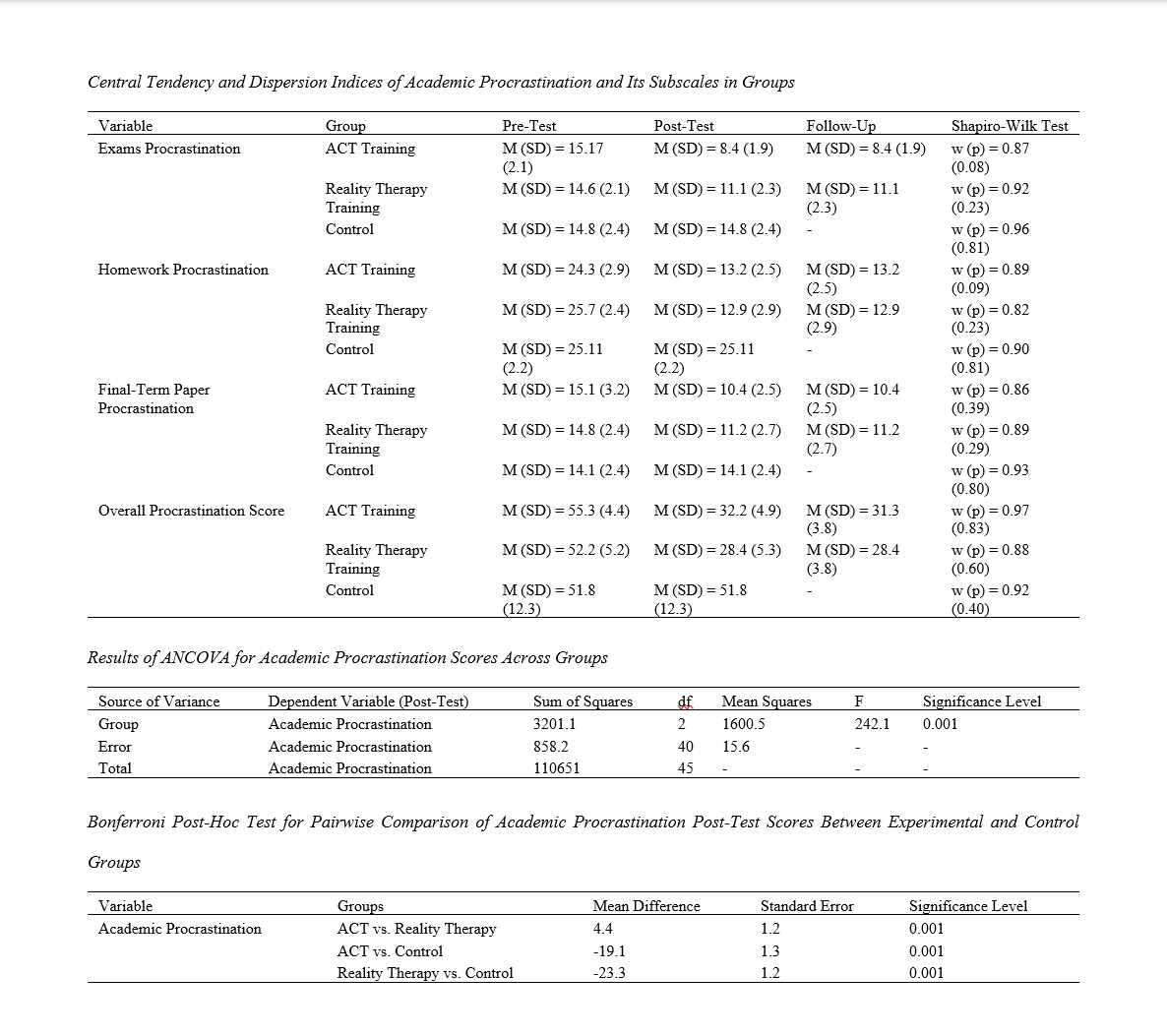Comparison of the Effectiveness of Reality Therapy and Acceptance and Commitment Therapy on Academic Procrastination in Female Students with Symptoms of Nomophobia
Keywords:
Acceptance and Commitment Therapy, Reality Therapy, Academic Procrastination, NomophobiaAbstract
The present study aimed to compare the effectiveness of Acceptance and Commitment Therapy (ACT) and Reality Therapy on academic procrastination in female high school students with symptoms of nomophobia. This research is classified as fundamental research and employs a quasi-experimental design with a pre-test, post-test, and follow-up, along with a control group. The statistical population consisted of all female high school students in the second cycle of secondary education in District 3 of Tehran during the 2023–2024 academic year. The sampling method was convenience sampling, and a total of 45 participants were selected. Data were collected using the Nomophobia Questionnaire by Yildirim and Correia (2015) and the Academic Procrastination Questionnaire by Solomon and Rothblum (1984). The protocol for the group therapy sessions based on ACT (Hayes et al., 1999) was adapted from Khatibi et al. (2020) and implemented over eight sessions, while the intervention protocol based on Reality Therapy was adapted from Eskandari (2017) and also conducted over eight sessions. Data analysis was performed using repeated measures analysis of variance. The results indicated a significant difference in the effectiveness of ACT and Reality Therapy on academic procrastination in female high school students with symptoms of nomophobia, with Reality Therapy leading to a greater reduction in academic procrastination compared to ACT.
Downloads
References
Afshari, M., Khayatan, F., & Yousefi, Z. (2022). Development of a Package of Reality-Oriented Acceptance and Commitment Therapy (RACT) and Comparing Its Effectiveness With Cognitive Behavioral Therapy (CBT) on Procrastination, Self-Efficacy and Academic Competence of Students With Academic Burnout. Jayps, 3(3), 220-239. https://doi.org/10.61838/kman.jayps.3.3.18
Akbari Zargar, N., Haqayeq, A., Jahanian, S., & Jabal Ameli, S. (2021). Comparing the Effectiveness of Acceptance and Commitment Therapy and Emotion-Focused Therapy on the Psychological Well-Being of Individuals with Cardiac Arrhythmia. Cardiovascular Nursing Journal, 10(1), 62-71. https://journal.icns.org.ir/article-1-696-en.html
Almurumudhe, L. K. A., Mahdad, A., Abdulkadhim Johni, A., & Yousefi, Z. (2024). The Mediating Role of Self-Esteem in the Relationship between Psychological Capital, Academic Engagement, and Academic Procrastination with Academic Performance among Students in Al-Diwaniyah, Iraq [Research Article]. Iranian Journal of Educational Sociology, 7(3), 1-9. https://doi.org/10.61838/kman.ijes.7.3.1
Asani, S. (2023). Effectiveness of Reality Therapy and Mindfulness-Based Cognitive Therapy in Academic Meaning and Academic Emotions of Procrastinating Students. Modern Care Journal, 21(2). https://doi.org/10.5812/mcj-137148
Asgharnezhadfarid, A. A., MirMohammadAli, M. D., Ahadi, H., & Nasiri, A. (2020). The Effectiveness of Cognitive Behavioral Therapy and Acceptance and Commitment Therapy on the Psychosocial Needs of Veterans. Veterans Medicine. https://doi.org/10.52547/ijwph.12.3.157
Davoodi, R., Manshaei, G., & Golparvar, M. (2019). Comparison of the Effectiveness of Cognitive Behavioral Therapy, Emotion-Focused Therapy, and Adolescent-Focused Mindfulness Therapy on Nomophobia Symptoms and Sleep Quality in Adolescent Girls with Symptoms of Nomophobia. Psychiatric Nursing, 7(5), 62-71. https://ijpn.ir/article-1-1400-en.html
Derakhshan, M., Maktabi, G., Alizadeh, M., & Abdi Shahivand, S. (2022). Examining the Relationship Between Intelligence Beliefs and Academic Procrastination With the Mediating Role of Social Cognition. Educational Strategies (Educational Strategies in Medical Sciences), 15(2), 100-110. https://www.sid.ir/paper/1021433/en
Emami Khotbesara, Z., Mahdian, H., & Bakhshipour, A. (2024). Comparing the Effectiveness of Academic Buoyancy and Psychological Capital Training on Academic Procrastination in Female High School Students [Research Article]. Iranian Journal of Educational Sociology, 7(3), 149-160. https://doi.org/10.61838/kman.ijes.7.3.18
Enayati Shabkolai, M., Enayati Shabkalai, M., & Bagheri Dadokolai, M. (2023). The Effectiveness of Treatment based on Acceptance and Commitment on Social Adaptation, Academic Self-Regulation and Cognitive Flexibility of Students with Specific Learning Disorders. International Journal of Education and Cognitive Sciences, 4(1), 33-41. https://doi.org/10.61838/kman.ijecs.4.1.5
Esmi, Z., Peyvesteh Ger, M., Parhoon, H., & Kazemi Rezaei, A. (2019). The Effect of Acceptance and Commitment Therapy on Mental Health, Quality of Life, and Self-Care Behaviors in Breast Cancer Patients. Psychiatric Nursing, 7(5), 44-53. https://ijpn.ir/article-1-1343-en.html
Galhardo, A., Loureiro, D., Raimundo, E., Massano-Cardoso, I., & Cunha, M. (2020). Assessing nomophobia: validation study of the European Portuguese version of the Nomophobia Questionnaire. Community Mental Health Journal, 56(8), 1521-1530. https://doi.org/10.1007/s10597-020-00600-z
Garaaghaji, S., Vahedi, S., FathiAzar, E., & Adib, Y. (2016). The effectiveness of educational interventions based on acceptance and commitment therapy on students' academic procrastination. Journal of Developmental Psychology Iranian Psychologists. https://sanad.iau.ir/en/Journal/jip/Article/529164?jid=529164&lang=en
Gezgin, D. M., Hamutoglu, N. B., Sezen-Gultekin, G., & Ayas, T. (2018). The Relationship between Nomophobia and Loneliness among Turkish Adolescents. International Journal of Research in Education and Science, 4(2), 358-374. https://doi.org/10.21890/ijres.409265
Heshmati, A., Saed, O., Mohammadi, J., Zenoozian, S., & Yousefi, F. (2018). The efficacy of group acceptance and commitment therapy on reducingacademic procrastination and improving difficulty in emotion regulation: Arandomized clinical trial [Original Research]. Scientific Journal of Kurdistan University of Medical Sciences, 23(5), 65-77. https://doi.org/10.52547/sjku.23.5.65
Jahrami, H., Trabelsi, K., Boukhris, O., Hussain, J. H., Alenezi, A. F., Humood, A., Saif, Z., Pandi-Perumal, S. R., & Seeman, M. V. (2023). The Prevalence of Mild, Moderate, and Severe Nomophobia Symptoms: A Systematic Review, Meta-Analysis, and Meta-Regression. Behavioral Sciences, 13(1), 35. https://doi.org/10.3390/bs13010035
Khosh Akhlagh, H., & Yousefi, N. (2023). The Effectiveness of Reality Therapy Training on Distress Tolerance and Impulsivity in Recovered COVID-19 Patients at Rehabilitation Centers in Shahr-e Kord. Nursing Management Quarterly, 12(1), 1-9. https://ijnv.ir/article-1-990-en.html
Kohli, M., Gupta, N., Saini, P., & Kohli, G. S. (2022). Comparison of Acceptance and Commitment Therapy (ACT) and Cognitive Behavioural Therapy (CBT) for Treatment of Academic Procrastination. Ecs Transactions, 107(1), 3321-3327. https://doi.org/10.1149/10701.3321ecst
Li, S., Su, J., Zhao, D., Wang, J., & Wang, G. (2023). Future time perspective and academic procrastination among nursing students: The mediating role of mindfulness. Nursing Open. https://doi.org/10.1002/nop2.1630
Liang, Y. (2024). Attachment Anxiety and Nomophobia: A Moderated Parallel Mediation Model. Psychological Reports. https://doi.org/10.1177/00332941241226907
Mahmoudian, L., Zangeneh Motlaq, F., & Dehestani, M. (2021). The Effectiveness of "Reality Therapy" on Marital Apathy and Psychological Well-Being of Married Women. Health Promotion Management, 10(4), 96-107. https://jhpm.ir/article-1-1363-fa.html
Mechraoui, O. (2023). The Relationship Between Nomophobia and Psychological Distress in Tunisian Students: The Moderating Effect of Physical Activity. https://doi.org/10.21203/rs.3.rs-2963380/v1
Nikbakht, E., Abdekhodae, M. S., & Hasanabadi, H. (2014). Effectiveness of Reality Therapy Group Counseling Program on Academic Motivation and Procrastination. Research in Clinical Psychology and Counseling, 3(2), 81-94. https://doi.org/10.22067/ijap.v3i2.15434
Ouraki, M., Jahani, F., & Rahmanian, M. (2018). The Effectiveness of Acceptance and Commitment Therapy on Psychological Flexibility in Elderly Women. Clinical Psychology, 10(1), 47-56. https://jcp.semnan.ac.ir/article_3027.html
Rebetez, M. M. L., Rochat, L., Barsics, C., & Van der Linden, M. (2018). Procrastination as a self-regulation failure: The role of impulsivity and intrusive thoughts. Psychological Reports, 121(11), 26-41. https://doi.org/10.1177/0033294117720695
Russell, D. W., & Pang, Y. C. (2020). Loneliness. https://doi.org/10.1007/978-3-319-24612-3_1085
Sadeghi, M., Moheb, N., & Alivand Vafa, M. (2021). The Effectiveness of Acceptance and Commitment Therapy on Marital Burnout, Alexithymia, and Quality of Life in Women Affected by Marital Infidelity. Applied Family Therapy Quarterly, 2(3), 69-87. https://doi.org/10.18502/jchr.v10i4.8337
Salehian, R. (2018). The Effectiveness of Acceptance and Commitment Therapy on Emotional Independence of Mothers With Children With Intellectual Disabilities. Journal of the Faculty of Medical Sciences and Health Services of Sabzevar, 14(2), 110-116.
Sarvari, H., Sahebdell, H., & Ebrahim Pour, M. (2023). Comparing the Effectiveness of Motivational Psychotherapy and Reality Therapy on the Mental Health of Female Students. Islamic lifestyle with a focus on health, 7(1), 318-325. https://www.islamiilife.com/article_185441.html?lang=en
Soleymani, S., Mohammadkhani, P., & Zahrakar, K. (2023). Developing a model of symptoms of nomophobia in students based on attachment style, media literacy and locus of control with the mediation of Internet addiction. Journal of Adolescent and Youth Psychological Studies (JAYPS), 4(3), 83-96. https://doi.org/10.61838/kman.jayps.4.3.8
Wang, S., Zhou, Y., Yu, S., Ran, L. W., Liu, X. P., & Chen, Y. F. (2017). Acceptance and Commitment Therapy and Cognitive-Behavioral Therapy as Treatments for Academic Procrastination: A Randomized Controlled Group Session. Research on Social Work Practice, 27(1), 48-58. https://doi.org/10.1177/1049731515577890
Williams, M. T., Chapman, L. K., Buckner, E. V., & Durrett, E. L. (2016). Cognitive Behavioral Therapies. Springer International Publishing/Springer Nature. https://doi.org/10.1007/978-3-319-25501-9_4
Xu, S. (2021). Academic procrastination of adolescents: a brief review of the literature. Online Learning, 21(39), 79. https://www.sciencepublishinggroup.com/article/10.11648/j.pbs.20211006.12
Xu, X., Wang, Y., Lu, Y., & Zhu, D. (2023). Relative Deprivation and Academic Procrastination in Higher Vocational College Students: A Conditional Process Analysis. The Asia-Pacific Education Researcher, 32(3), 341-352. https://doi.org/10.1007/s40299-022-00657-2

Downloads
Additional Files
Published
Submitted
Revised
Accepted
License
Copyright (c) 2025 Mansoureh Sadat Ghoreishi (Author); Reza Khakpour (Corresponding Author); Simindokht Rezakhani (Author)

This work is licensed under a Creative Commons Attribution-NonCommercial 4.0 International License.







